What is Atithi Devo Bhava (Guest is God) meaning (correct explanation) | Explain how relevant is the concept of atithi devo bhava | What does Hinduism say about guests (Hospitality in Hindu culture)? | Kapota pakshis (Dove birds) story
Namaste friends, how are you doing today? Welcome to #BhagavanBhakthi website / blog.
Bhagavan Lord Sri Krishna (Vishnu) (Rama) (Trivikrama) and Goddess Sri Lakshmi blessings to you and your family!
In this website / blog, you will always learn about #Hinduism #Sanskrit language.
Also subscribe to my YouTube channel from this link #BhagavanBhakthi to view videos about #Hinduism #Sanskrit language.
Just before going to “What is Atithi Devo Bhava (Guest is God) meaning (correct explanation) | Explain how relevant is the concept of atithi devo bhava | What does Hinduism say about guests (Hospitality in Hindu culture) | Kapota pakshis (Dove birds) story“, let us know a brief, basic and very important information.
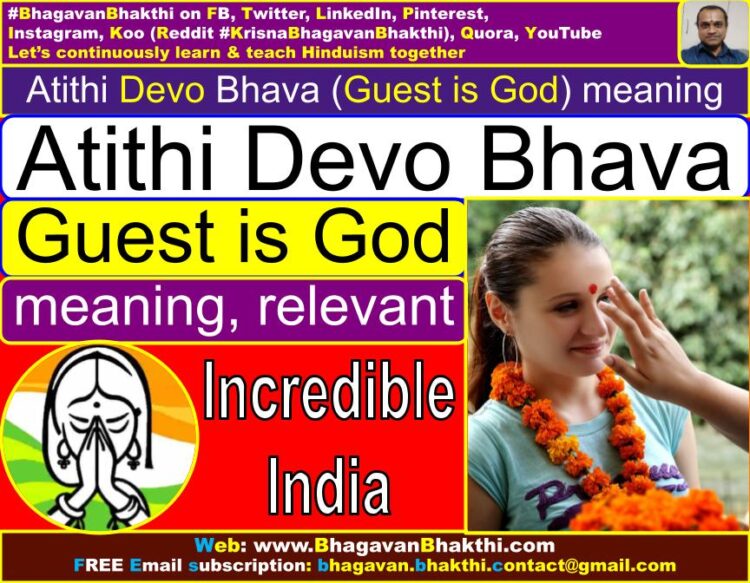
What is the Sanskrit word for guest is God : In Sanskrit ‘Guest is God’ is written as ‘Atithi Devo Bhava’ (अतिथि देवो भव) (atithi dēvō bhava).
Where was the word Atithi Devo Bhava derived from : This is derived from a Hindu text called as ‘Taittiriya Upanishad’, Shikshavalli I.11.2
Who invented Atithi Devo Bhava : It was not invented by anyone, but is present since the start of Sanatana Dharma. Recently Indian government started “Atithi Devo Bhava” as a campaign by the Ministry of Tourism in 2005.
‘Atithi Devo Bhava’ is a Sanskrit shloka which has very prominent and great meaning in it. From outside it gives one meaning, but when we learn the meaning from a correct Guru, we can really find the inside meaning of this.
What does Athithi mean in Sanskrit : In Sanskrit Atithi means guest. In Sanskrit Atithi is written as अतिथी (atithī). Atithi means someone who receives the ‘atithya’ (आतिथ्य) (ātithya), that is, hospitality.
What is the meaning of Atithi Devo Bhava : Generally Atithi Devo Bhava means ‘Guest is God’. But it has another meaning also as given below.
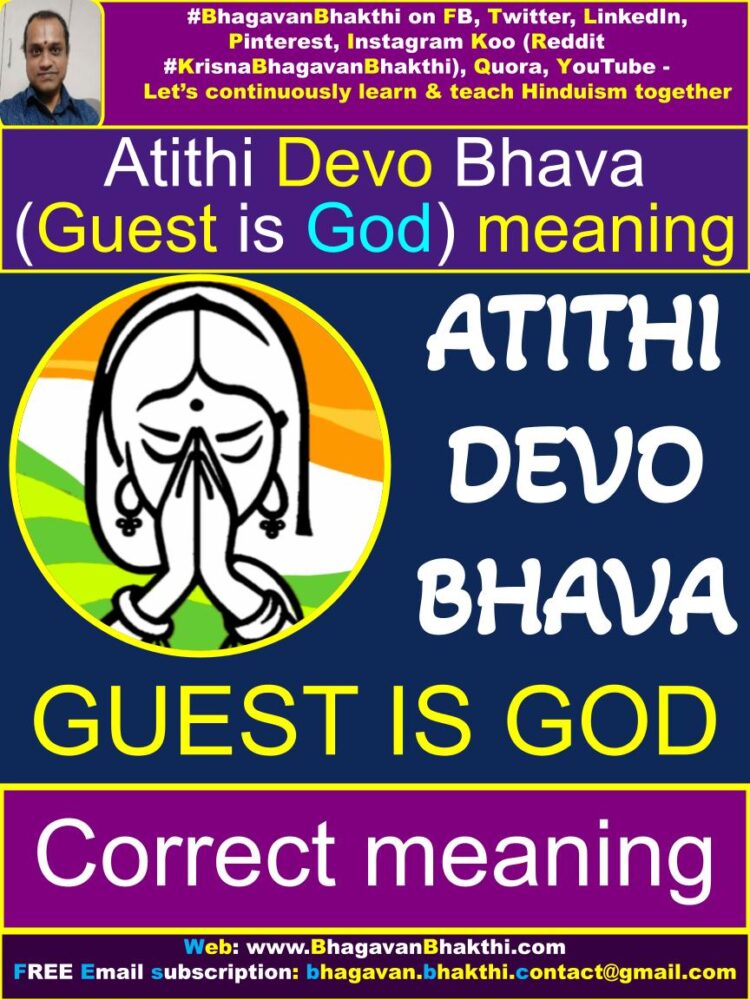
Outside meaning of ‘Aithi Devo Bhava’ : Whoever visits our home, i.e. as a guest, he / or she or they put together are called as God(s). And they need to be treated as Gods. But, can humans become God?
Inside meaning of ‘Atithi Devo Bhava’ : A person or people who visit our home, within that person or people directly resides Lord Sri Vishnu (God) as ‘Antaryami’ (divinely within). Thus we have to satisfy our guests by providing them with all the hospitality they need and by giving that person or those people the respect they need.
To explain more about the meaning of ‘Atithi Devo Bhava’ (Guest is God), the most famous saying is that within the guests there is the presence of Lord Sri Vishnu (God) as ‘Antaryami’.
Thus, it is the duty and spirit of all Hindu and Indian tradition and culture to take proper care of the guest and fulfill their needs in the best possible manner.
That is, we should offer the best hospitality to the guest and with this hospitality not only the guest should be happy and satisfied with our hospitality and bless us, but Lord Sri Vishnu (God) should also be pleased with our hospitality and should bless us and our family.
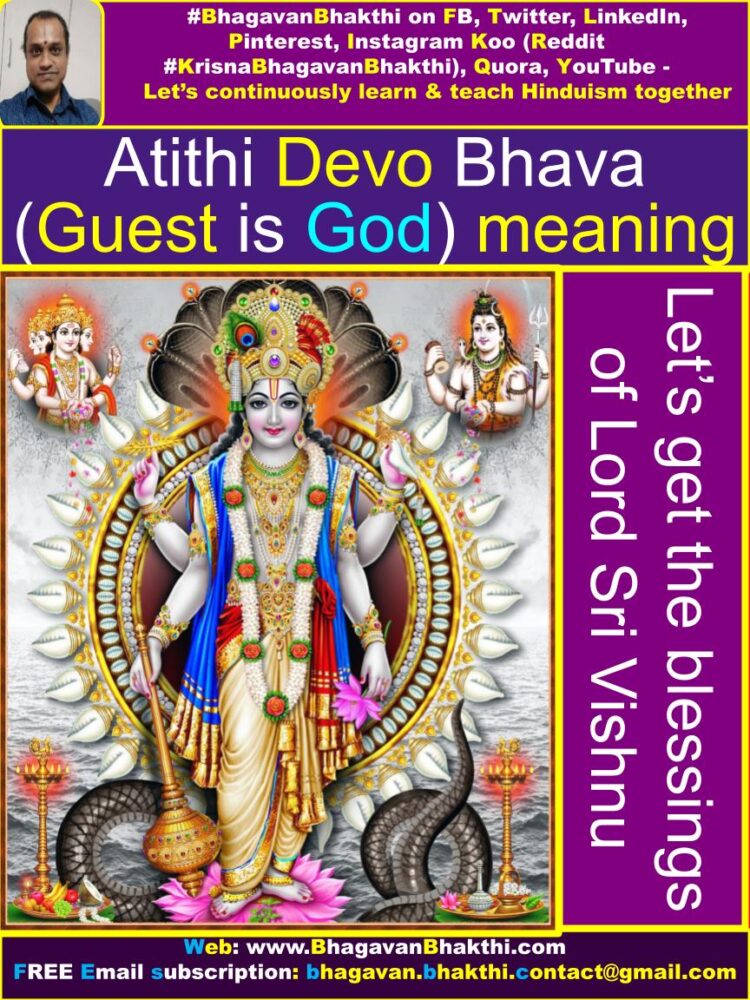
This is the divine, real and inside meaning of the Sanskrit shloka ‘Atithi Devo Bhava’, that is, ‘Guest is God. Same holds good for ‘Mathru Devo Bhava’, ‘Pithru Devo Bhava’ and ‘Acharya Devo Bhava’.
Here mathru (mother), pithru (father) and acharya (teacher / Guru) are not God. But, Lord Sri Vishnu is present in all of them as ‘antaryami’ and thus we need to respect all these people keeping in mind the inside meaning of all these shlokas.
Thus, this truly reflects the rich and cultural heritage and warm hospitality of the people of India with respect to atithis (guest).
Many call that Hindu (Sanatana Dharma) civilization is existing since 3k years or 5k years, which is completely incorrect and unacceptable as per Hindu Granthas (texts).
We Sanatana Dharmis (Hindus) are existing on this earth since the creation of the universe and earth. No on knows about the exact timeframe about the starting of the Sanatana Dharma (Hinduism).
India is a country with an amazing wealth of diversity. India stretches from the eternal snows of the Himalayas in the north to the peninsula in the south, from the arid deserts in the west to the humid deltas in the east. Thus, it gives visiting tourists an incredible choice of places to relish and enjoy in India.
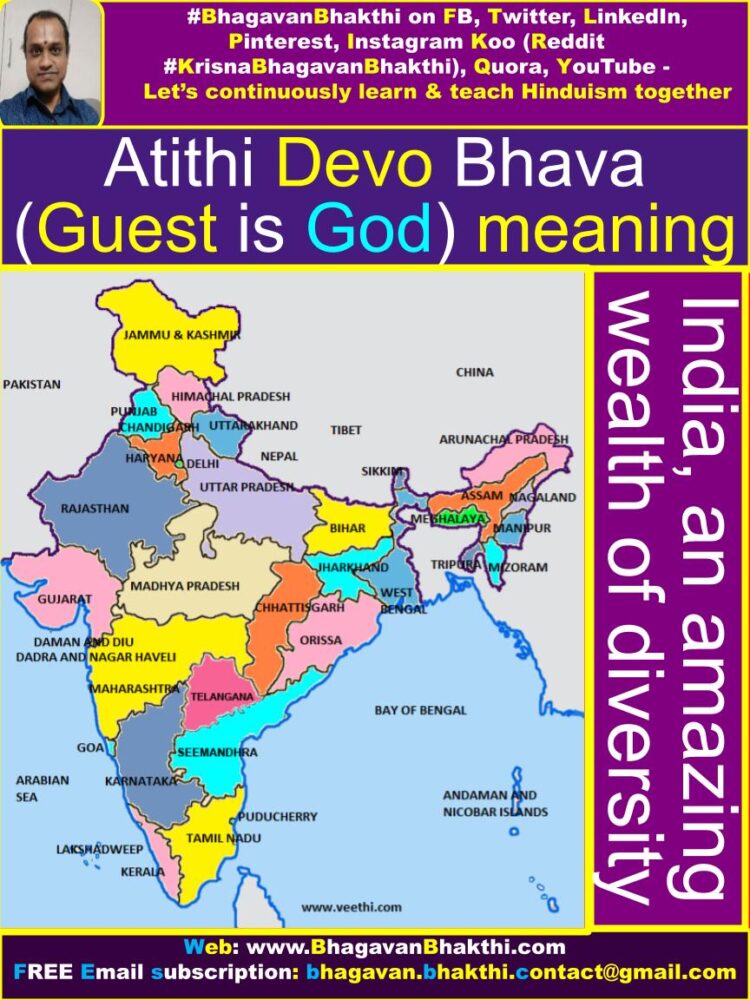
India has the biggest constitution and largest democracy in the world. India is a proud country of diverse religions, languages, races, cultures, flora and fauna etc.
India is the second most populous country in the world after China and has twenty nine states, twenty two languages, many religions and several rivers like the most famous and divine Ganges, Indus, Brahmaputra etc. Its diversity is the essence of the country.
Lotus flower is the national flower of India. The tiger is the national animal and the elegant peacock is the national bird of India.
India has given birth to religions like Jainism, Sikhism and Buddhism. Many foreign religions like Islam, Christianity and Zoroastrianism can be found in the country.
In Sanatana Dharma (Hinduism) guests are welcomed with five steps. It is called ‘Panchopachara Pooja’, i.e. Pooja (puja) or worship consisting of five different steps.
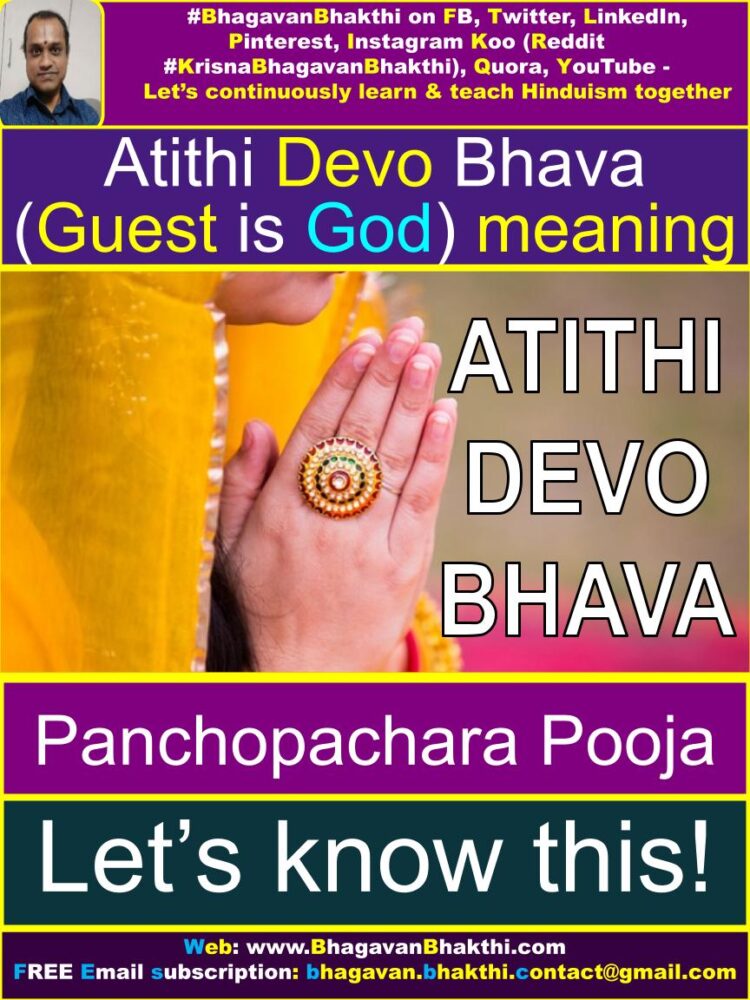
The five steps which shows the Hindu way of welcoming and receiving guests is as given below [What does Hinduism say about guests (Hospitality in Hindu culture)]:
Dhupam (fragrance) : As per Sanatana Dharma (Hindu culture), when receiving guests, the house should have a pleasant aroma. Because, it is the first thing that attracts anyone, including a guest. A pleasant fragrance puts the guest in good esteem and comfort.
Deepa (Diya) (Lamp) : Hindu culture says that we Hindus welcome our guest using Deepa (Diya) (lamp). We do ‘arati’ (आरति) of our guest to welcome them inside our home. It is an expression of respect towards the guest. We welcome our guest with utmost courtesy and respect.
Naivedya (divine food) (Bhog) : We Indians, serve food to the guests after showing ‘naivedya’ (offerings) to Lord Sri Vishnu and other deities (Devatas). That food will be in variety like rice, cereals, fruits, sweets made of milk, etc. to name a few.
Akshata (divine rice) : We Hindus welcome our guest by putting ‘akshata’ (a form of rice) on the head and body of our guest. It is a symbol of undividedness. Often a tilak made of vermilion paste is placed on the guest’s forehead while welcoming. It is the highest form of welcome in Hindu Indian families.
Pushpa (flowers) : According to Hindu tradition, flowers are a symbol of goodwill and prosperity. When the guests leaves, we give them flowers, as the flower symbolizes the sweet memories of the visit which would stay with them for a long time.
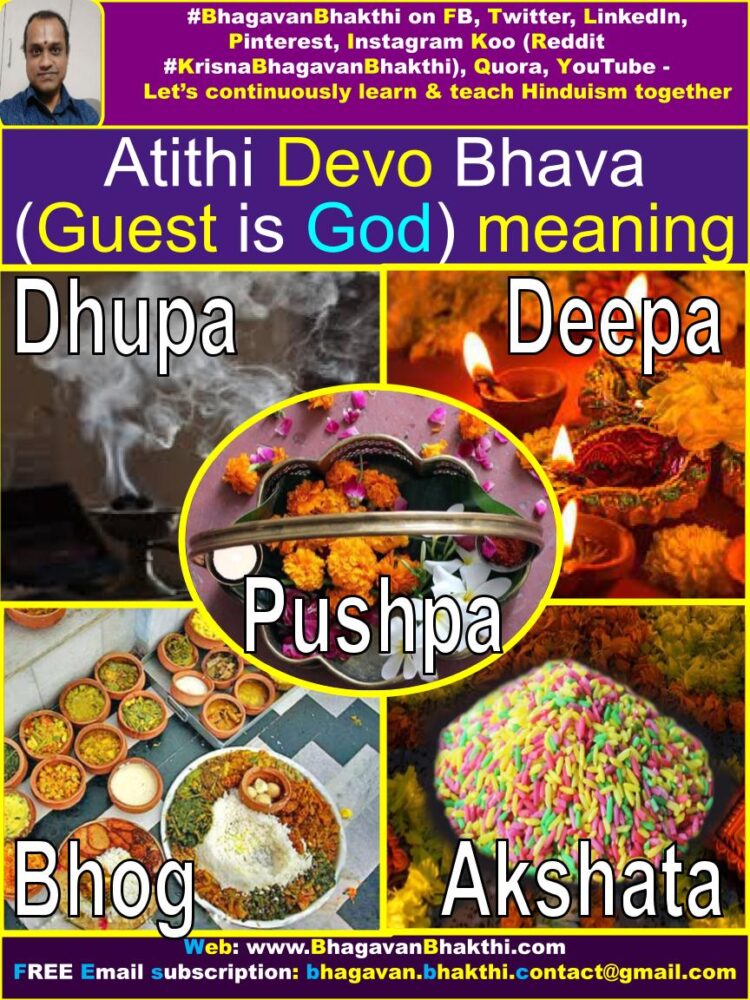
Atithi Devo Bhava examples in Hinduism (Ramayana, Mahabharata, Puranas, etc.) (hospitality examples in Hinduism) is as given below:
Lord Krishna and Sudama : When Sudama Brahmin visited Dwaraka during the Dwapara Yuga, Lord Shri Krishna showed us the way to perform atithi (guest) service (hospitality).
Lord Shri Krishna welcomed Sudama Brahmin into his palace (royal palace of Consort Mitravinda) and offered Atithya (hospitality) to Sudama. Lord Krishna cleaned Sudama Brahmin’s feet, gave him food, clothes etc.
Here Lord Shri Krishna is showing every human being on earth how to take care of a guest and how to offer good hospitality (atithya) to a atithi (guest).
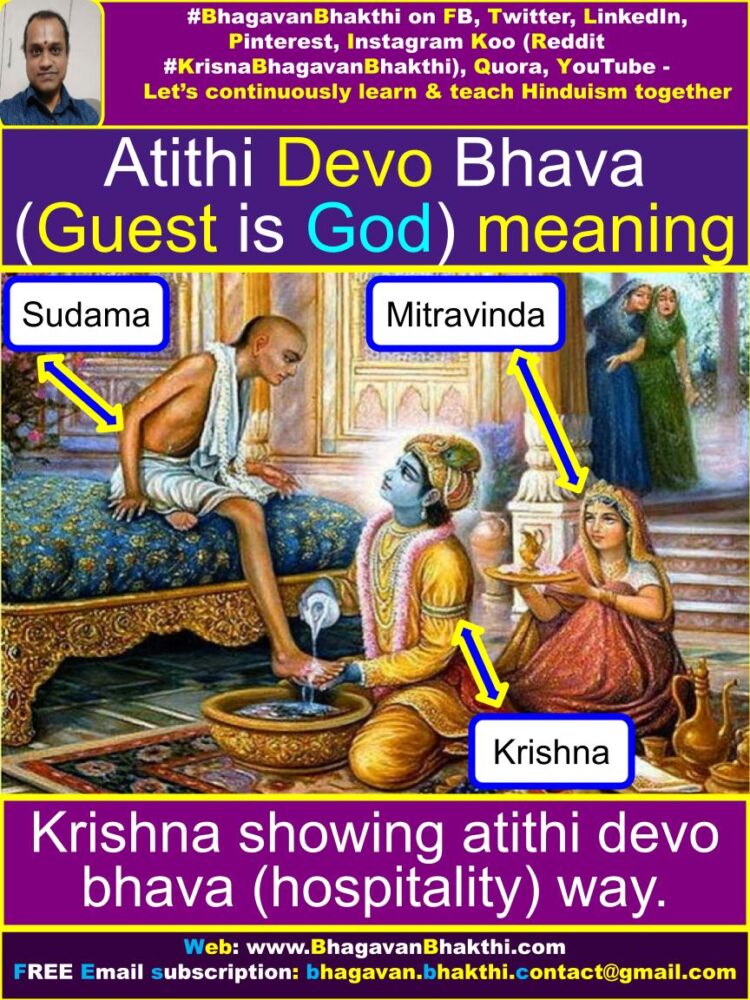
Lord Krishna and Vidura : Before the Mahabharata (Kurukshetra) war and after the ‘peace talks’, Lord Sri Krishna refused to stay in the houses of Duryodhana, Drona, Bhishma, Karna, etc.
Lord Sri Krishna did this because all these did not act in the right spirit during ‘Draupadi Vastrabharana’ episode and thus Lord Sri Krishna did not accept the hospitality of these people.
But, Lord Shri Krishna was very happy to accept Vidura’s ‘atithya’ (hospitality). This is another good example of ‘Atithi Devo Bhava’ (Guest is God).
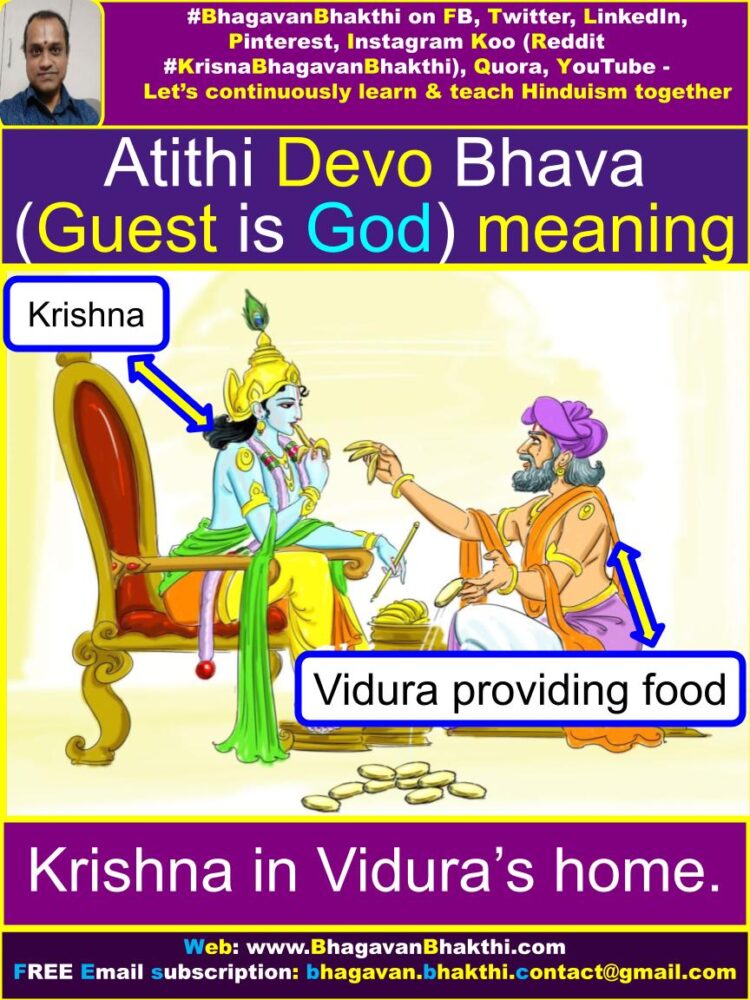
Hanuman and Ravana : When Lord Hanuman went in search of Goddess Sri Sita Devi in Lanka, he was attacked by the Lankan army and they tried to capture and kill Lord Hanuman.
Later, Ravana ordered his soldiers to set Lord Hanuman’s tail on fire, instead of offering him ‘atithya’ (hospitality) as Lord Hanuman was a peace ambassador and a guest in Ravana’s court.
This is exactly what shouldn’t be done with the atithi (guest) and this is a great example of going against the ‘atithya’ (hospitality) as per Hindu Sanatana Dharma.
We all know what happened after this. Half of the city of Lanka was burnt down by our Lord Sri Hanuman within minutes. (As you sow, so you shall reap).
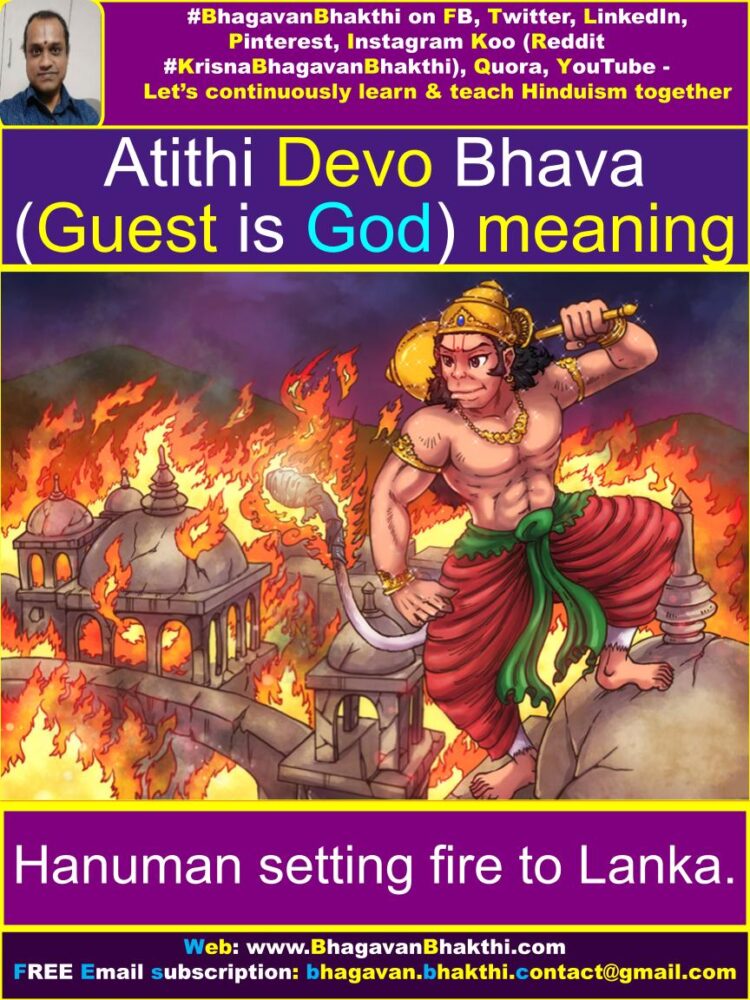
Draupadi in Indraprastha : After Yudhishthira became the King of Indraprastha, Draupadi Devi became the queen of that place.
Goddess Draupadi was such a pious woman that she used to cook for around 100,000 people every day with the help of some other people. She not only prepared food but also fed the needy and Brahmins daily for nearly 15 years in Indraprastha.
This tradition is still followed by many temples like Tirupati (Andhra Pradesh), Dharmasthala (Karnataka), ISKCON (PAN India), Puri Jagannath Temple (Odisha), Annapurneswari Temple (Karnataka), etc.
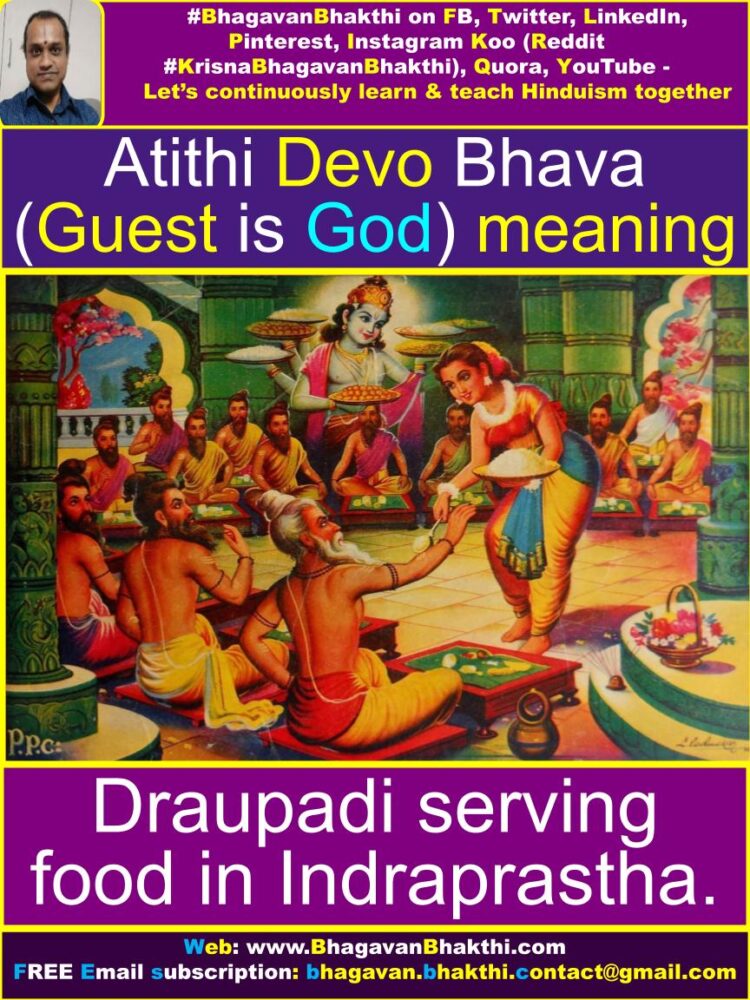
Jamadagni and Kartavirya Arjuna : Once upon a time in Satya Yuga a great king and a great devotee of Lord Dattatreya, namely, King Kartavirya Arjuna arrives at Maharishi Jamadagni’s ashram (hermitage) with his huge army.
In this ashram (hermitage) there was a divine cow called Kamadhenu, which fulfilled all wishes including providing food. King Kartavirya Arjuna had 1,000 hands.
As Kartavirya Arjuna visited Maharishi Jamadagni’s ashram (hermitage), Maharishi Jamadagni requested the Kamadhenu cow to provide required food to King Kartaviraya Arjuna and his huge army.
Kamadhenu provided food to everyone with her divine powers. King Kartavirya Arjuna then had another plan, which was to try to steal this cow from Maharishi Jamadagni’s ashram. This is a good example of how not to behave after receiving good hospitality.
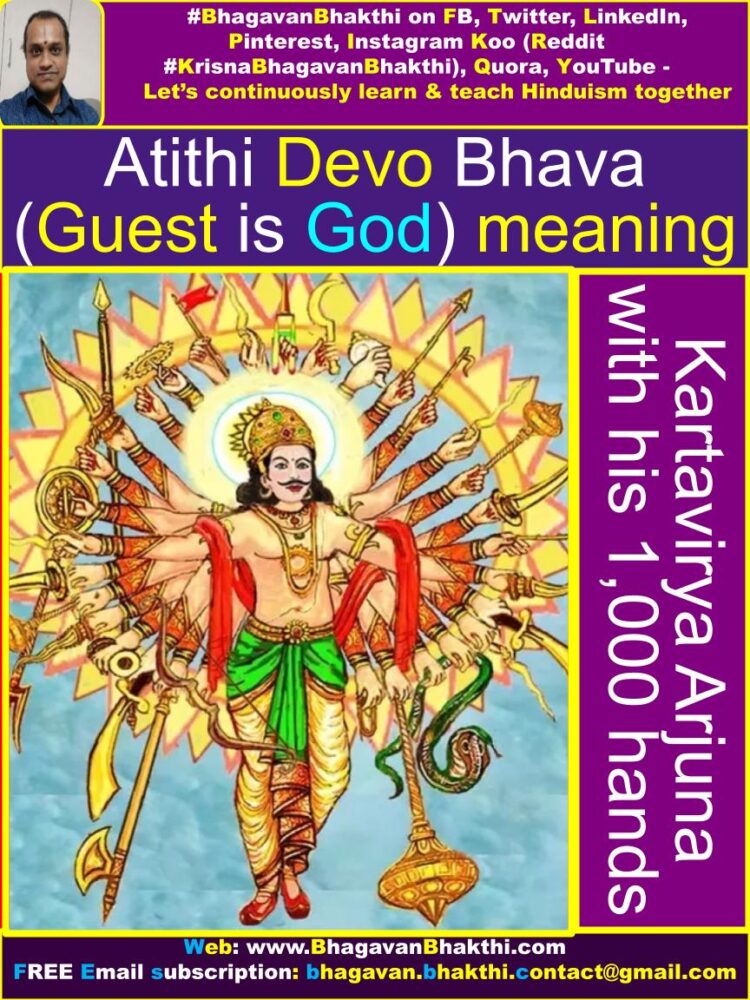
Kapota pakshis (Dove birds) story which gives explanation about the importance about ‘Atithi Devo Bhava’ (Guest is God) is as given below:
On a hill known as Brahmagiri there used to live a hunter who was very cruel. This hunter not only killed birds and animals, but also Brahmanas (Brahmins) and Rishis as well.
The hunter once went hunting. He killed many animals and birds and caged some of them. He had penetrated far into the forest and was far from his home.
It was night and it started raining. The hunter lost his way and began to feel hunger and thirst. He decided to climb a tree and spend the night there. But his mind was returning to his wife and children at home.
For many years the kapota (pigeon / dove) bird and its family lived happily on that tree. Both the male and female birds were out looking for food.
But the male dove (pigeon) returned to the nest, but the female dove (pigeon) did not. In fact, the female bird was captured by the hunter and was now inside a cage. The male bird did not know this. He was anxiously waiting for his female counterpart.
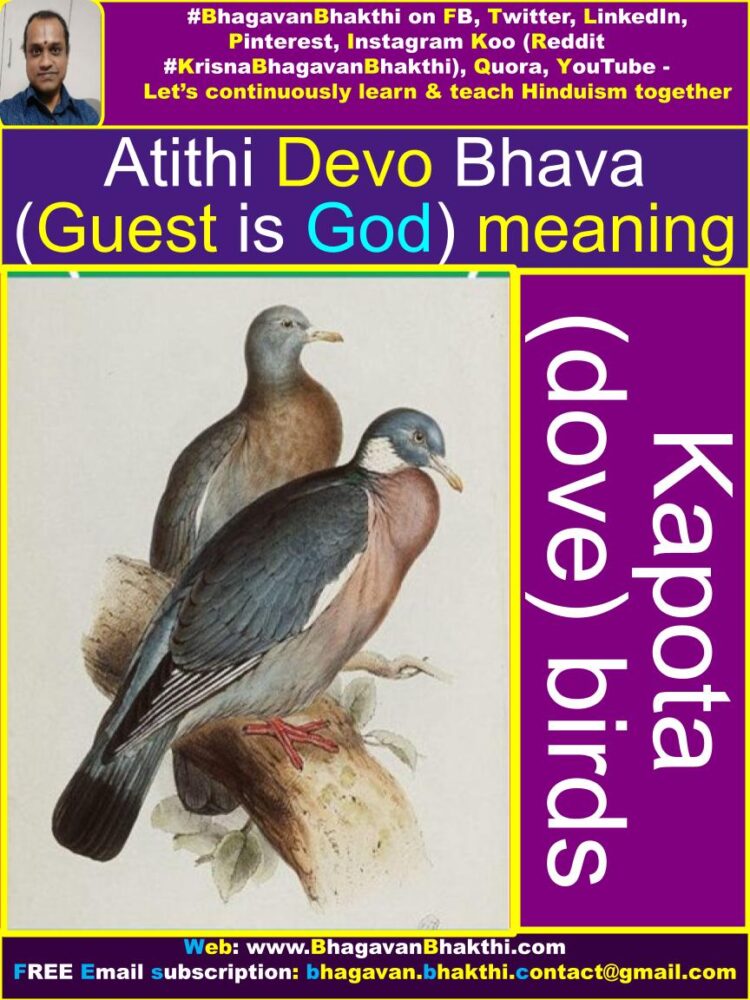
The female pigeon (dove) in the cage heard these distressing words of her male counterpart and made her presence known. The male pigeon (dove) came down and found his wife inside the cage.
The hunter was now fast asleep, the male bird thought this is the right time and it decided to release the female bird.
No, replied the female dove. You know how it is with creatures. One organism lives on another. I see nothing wrong with the hunter, he is just gathering his food. He is like an atithi (guest) to us. And it is our duty to offer our body for the guest.
You are right, said the male pigeon (dove). I had lost all sense of propriety. We have to serve our atithi (guest). But how do we serve our atithi (guest)? There is nothing we can call our own.
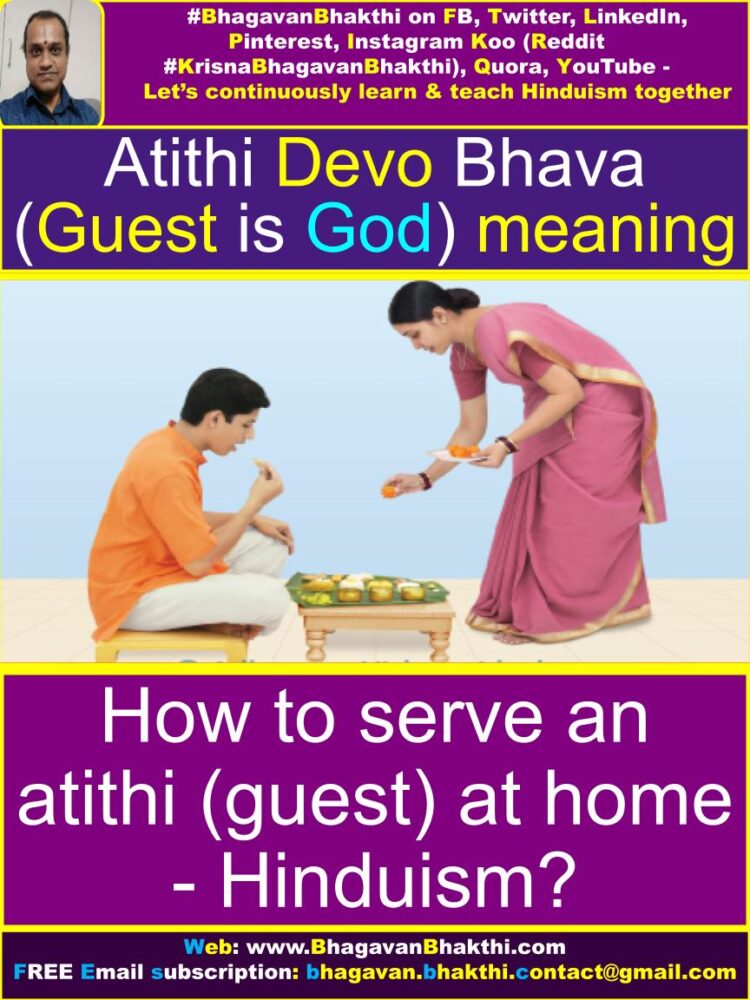
The female dove replied that the hunter was suffering more from cold at this time. We have to light a fire to warm him. Go find a fire and bring enough dead leaves and twigs to start the fire, said the female dove to male dove.
A male dove finds a flammable branch. He brought many dry leaves and twigs for the fire to burn. The rain stopped and the fire warmed the hunter.
Now, the female dove said, ‘Set me free, so that I may ‘sajeeva dahanam’ (burn alive / self incineration) in the fire. My roasted meat can be fed to the hunter.
Never, answered the male pigeon (dove). It is my duty and right to serve the guest first. Saying this, the male pigeon threw it into the fire.
The hunter overheard the entire conversation of the male and female pigeons (doves) and was amazed at how ‘paropakaari’ (philanthropic) the two pigeons could be.
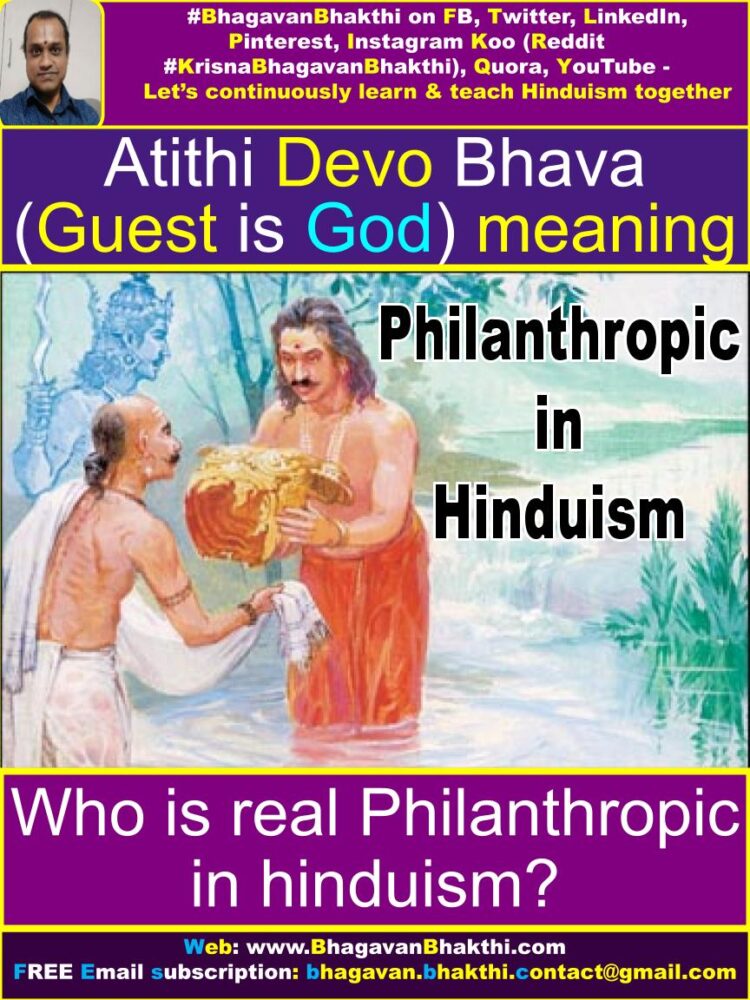
The female pigeon now requested the hunter to release her from the cage. And as soon as he had done this, the dove threw herself into the fire. This selfless wit of the two pigeons was so great that a ‘divine plane’ came to take the two pigeons directly to Swarga (Heaven).
Even the cruel hunter was moved and regretfully repented. He said to the doves, You are truly divine and truly great. Before you go to Swarga (Heaven), please tell me how I can do tapasya (penance) for my cruelty.
“Go to the Gautami Ganga river (Godavari River) and bathe there for a fortnight (15 days). All your sins will also be forgiven,” said the pigeons (dove birds).
The hunter did as told. The place where the pigeons (dove birds) cremated themselves became the holy tirtha known as ‘Kapota Theertham’, as the word Kapota means pigeon (dove) in Sanskrit. (This story is taken from Brahma Purana).
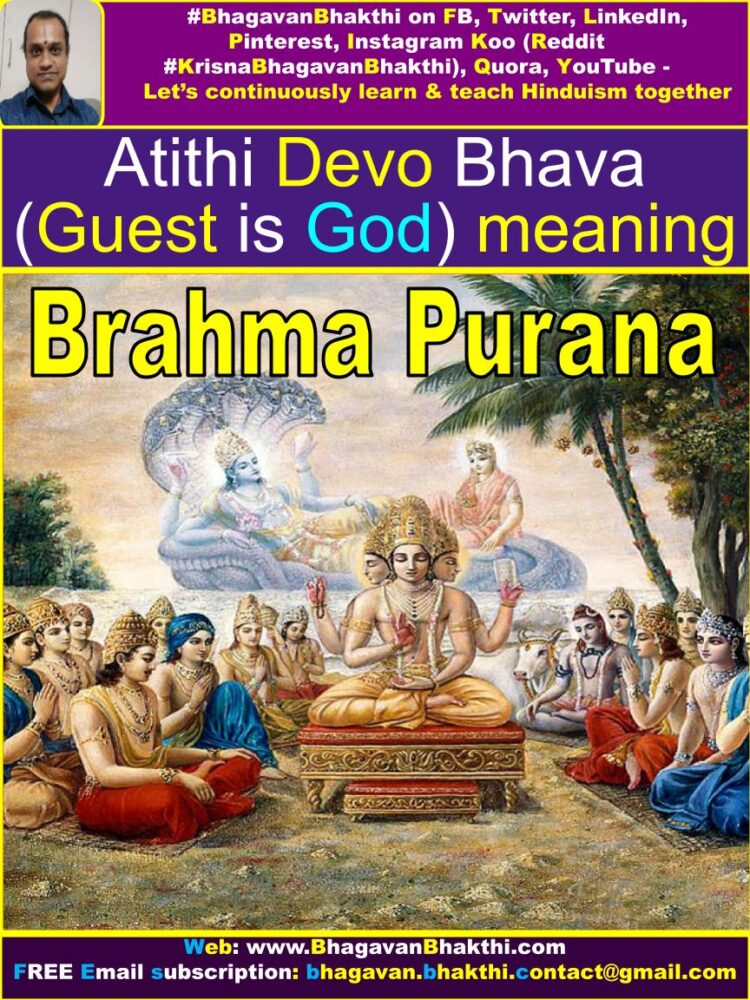
PS : Few people may think, how two birds can talk to each other, how humans can understand two birds talking language. All these are just myths, etc.
But we must understand that our country is not an ordinary country. Our ancestors were not merely ordinary or merely humans. Every now and then Swayaam Lord Sri Vishnu takes incarnation (avatar) in this great Bharata Varsha (India) or sends many deities to this great Bharata Varsha (India).
These are not difficulties for these demigods (or great persons). Even today there are many people who can talk to birds and animals. Indian culture is not just an another culture.
Also, it should be noted that in Indian culture we give a lot of importance to atithi (guest) in our life. We have to do our best for them, otherwise even Lord Sri Vishnu will be displeased with us.
Please note that after doing great harm to people or mankind, if someone takes a bath in the divine rivers it doesn’t means that will help them to get relief from all their past sins.
The real meaning of the story here is that after taking bath in the early morning, we have to do fasting and several other austere acts to get rid of the bad karmas done in our present and past lives.
It is not as easy and simple as we may think, but definitely not at all impossible if we have true devotion in Lord Sri Vishnu and other Devatas (deities).
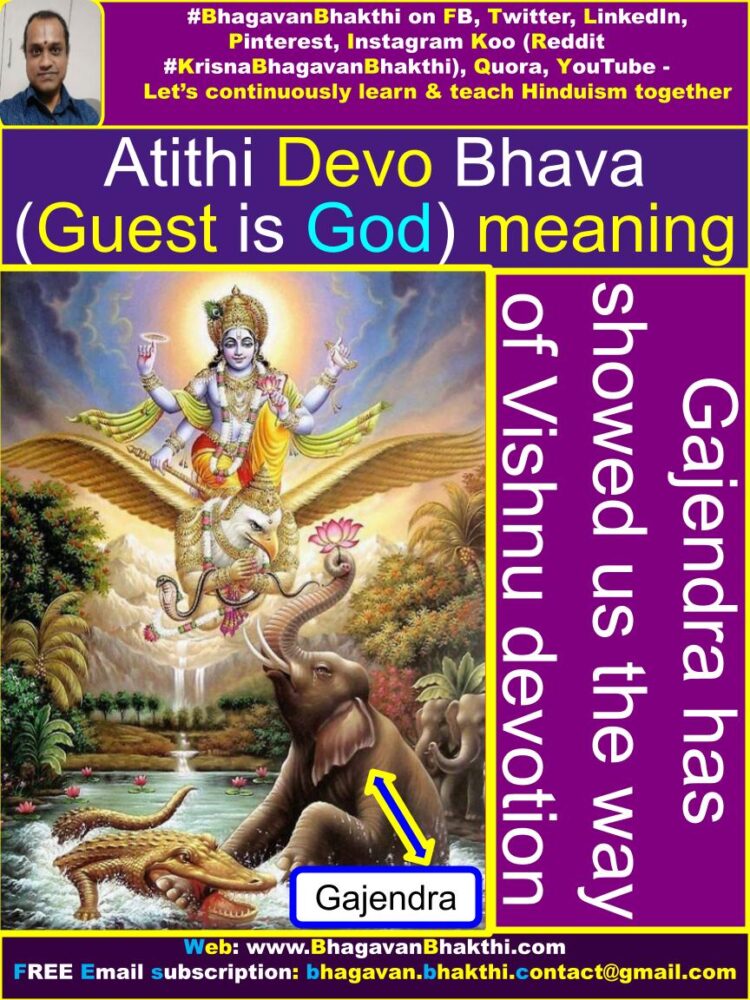
More information will be added to his post (article) on regular basis. Please visit again to know the updated information after some time.
Continue reading about Hinduism (Sanatana Dharma) :
Rivers information in Hinduism (Sanatana Dharma)
Hinduism (Sanatana Dharma) information, facts, etc.
Mahabharata information, facts, significance, importance etc.
Ramayana information, facts, significance, importance, etc.
To watch videos on #Hinduism #Sanskrit language, SUBSCRIBE to my YouTube channel from this below link:
#BhagavanBhakthi YouTube channel
Dear friends, if you need any clarifications about this post, kindly let me know, I will definitely try to answer all of them.
Also your one LIKE, one COMMENT, One Share, one SUBSCRIPTION is highly important.
This will help to know the quality of this content and also it will be helpful to know if any improvements is required for the content.
If you feel this content is useful to you and has helped you to improve your knowledge, kindly share this with your well-wishers.
Because “SHARING MEANS CARING”.
To receive FREE EMAIL SUBSCRIPTION about #BhagavanBhakthi, you can send an email to [email protected] from your email ID.
NAMASTE!
Sri Gurubhyo Namaha
Sri Krishnaayan Namaha
Sri Krishnaarpanamastu
Share in Social Media
you’re really a excellent webmaster. The website loading pace
is amazing. It kind of feels that you’re doing
any unique trick. Moreover, The contents are masterpiece.
you have done a fantastic job on this matter!
Thank you for your beautiful words. Do read my other posts too, to know more about #Hinduism #SanatanaDharma Keep in touch.
Shubhamastu!
I couldn?t resist commenting. Exceptionally well written!|
I think that is among the so much important info for me.
And i’m happy reading your article. However want to statement
on few general issues, The web site style is perfect,
the articles is actually nice : D. Good job,
cheers
Everything is very open with a precise description of the issues.
It was really informative. Your site is very
useful. Thank you for sharing!
Thanks for finally talking about > What is Atithi Devo Bhava (Guest is God) meaning | Kapota pakshis (Dove birds) story –
Bhagavan Bhakthi (Hinduism) < Loved it!
I got this web site from my pal who told me approaching this web site and at the moment this get older
I am visiting this web pwge and reading extremely informative articless
or reviews at this place
Hi there everyone, it’s my first pay a quick visit at this web page, and
piece of writing is actually fruitful for me, keep up posting such articles or reviews.
Hey very nice blog!
Having read this I thought it was very enlightening.
I appreciate you spending some time and energy to put
this article together. I once again find myself spending way too much time both reading and
leaving comments. But so what, it was still worthwhile!
Pretty! This has been an incredibly wonderful article. Many thanks for providing this info.
I blog frequently and I seriously thank you for your content.
This great article has truly peaked my interest.
I’m going to book mark your site and keep checking for new details about once per week.
Pretty! This has been a really wonderful post.
Many thanks for providing this info.
I have been surfing online more than three hours nowadays, but I by no means found any interesting article like yours.
It is lovely worth enough for me. In my view, if all webmasters and bloggers made just
right content material as you did, the web can be a
lot more helpful than ever before.
Marvelous, what a web site it is! This web site gives valuable data to us,
keep it up.
Good article. I absolutely appreciate this site. Keep it up!
This post is invaluable. Where can I find out more?
Please click this link Bhagavan Bhakthi for more information. Shubhamastu!
Thank you for writing such an excellent article. It helped me a lot and I love the topic.
You’re thus amazing. Oh my Our god. The almighty bless you.
You could definitely see your skills within the work you write. The world hopes for even more passionate writers like you who are not afraid to mention how they believe. Always go after your heart.